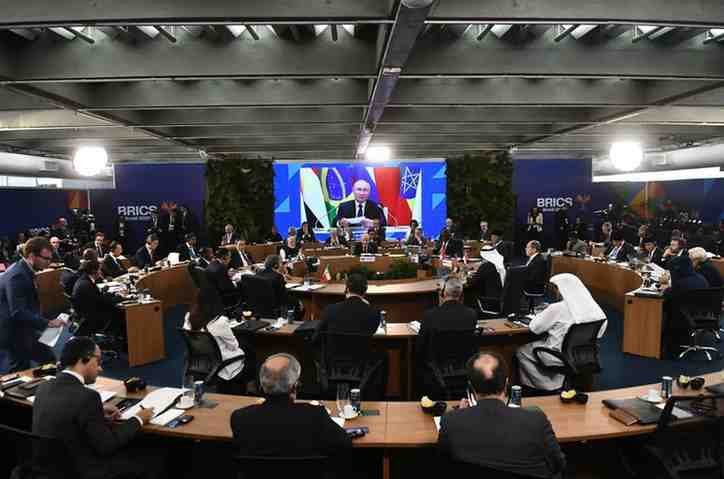Rio de Janeiro: Leaders of BRICS nations on Sunday issued a unified and strong condemnation of the April 22 terrorist attack in Jammu and Kashmir’s Pahalgam, which resulted in the deaths of 26 people and left several others injured.
In a joint declaration at the conclusion of the 17th BRICS Summit held in Rio de Janeiro, the bloc described the attack as “criminal and unjustifiable” and reiterated its firm commitment to combat terrorism in all forms.
Hosted under Brazil’s presidency, the summit brought together heads of state and representatives from Brazil, Russia, India, China, and South Africa, along with new BRICS members Egypt, Ethiopia, Iran, the United Arab Emirates, and Indonesia.
The statement issued by the bloc underscored a collective call for global unity and action against terrorism and extremist violence.
In their declaration, the leaders emphasized that acts of terrorism are unacceptable, regardless of motivation, geography, or identity of the perpetrators.
“We express strong condemnation of any acts of terrorism as criminal and unjustifiable, regardless of their motivation, whenever, wherever and by whomsoever committed,” the statement read.
Referring directly to the April 22 attack in India’s northern region, it added, “We condemn in the strongest terms the terrorist attack in Jammu and Kashmir on 22 April 2025, during which 26 people were killed and many more injured.”
The Pahalgam incident, which targeted a civilian bus carrying pilgrims and tourists, has been widely perceived in India as an act of cross-border terrorism.
Although the BRICS declaration did not name Pakistan, the language used—particularly the condemnation of terrorism financing, cross-border movement of terrorists, and safe havens—reflected concerns long raised by New Delhi.
Reaffirming their dedication to a “zero tolerance” approach to terrorism, the BRICS leaders called on the international community to avoid selective condemnation and to reject the practice of applying double standards in dealing with terrorism.
“We urge to ensure zero tolerance for terrorism and reject double standards in countering terrorism,” the declaration noted.
Importantly, the leaders also stressed that terrorism must not be associated with any religion, ethnicity, nationality, or civilisation. “We reiterate that terrorism should not be associated with any religion, nationality, civilization or ethnic group and that all those involved in terrorist activities and their support must be held accountable and brought to justice in accordance with relevant national and international law,” the statement added.
In a significant push towards institutionalising global efforts against terrorism, BRICS leaders extended their support to the activities of the BRICS Counter-Terrorism Working Group (CTWG) and its five thematic subgroups.
These function under the larger umbrella of the BRICS Counter-Terrorism Strategy and Action Plan, aimed at enhancing coordination, intelligence sharing, and best practices among member countries.
The summit’s final document welcomed the ongoing work of the CTWG, highlighting its foundational documents including the Counter-Terrorism Strategy, the Action Plan, and the CTWG’s position paper.
Leaders expressed a commitment to deepen cooperation in counter-terrorism and called for the rapid finalisation and adoption of the long-pending Comprehensive Convention on International Terrorism (CCIT) under the United Nations framework.
“We welcome the activities of the BRICS Counter-Terrorism Working Group (CTWG) and its five Subgroups based upon the BRICS Counter-Terrorism Strategy, the BRICS Counter-Terrorism Action Plan and the CTWG position paper.
We look forward to further deepening counter-terrorism cooperation. We call for an expeditious finalization and adoption of the Comprehensive Convention on International Terrorism in the UN framework,” the declaration stated.
Furthermore, the leaders demanded effective international action against all individuals and organisations designated by the UN as terrorists, pressing for accountability and sanctions.
“We call for concerted actions against all UN-designated terrorists and terrorist entities,” the statement concluded.
The BRICS summit’s sharp stance on the Pahalgam attack was seen as a diplomatic win for India, which has consistently urged the international community to speak in one voice against terrorism emanating from across its borders.
While the omission of a direct reference to Pakistan may reflect the bloc’s consensus-based diplomacy, the inclusion of terms such as “cross-border terrorism” and condemnation of safe havens for terrorists aligned closely with India’s position.
The declaration marks a continuation of BRICS’ evolving role on global security issues. Traditionally focused on economic and developmental cooperation, the bloc has increasingly addressed pressing global security challenges in recent years, particularly as newer members with strong regional influence have joined the forum.
The emphasis on unity in confronting terrorism, coupled with a call for equitable and comprehensive international legal frameworks, reflects BRICS’ growing ambition to shape global governance.
It also signals an emerging solidarity among Global South nations on issues related to security, sovereignty, and multilateralism.
The 17th BRICS Summit concluded with a resounding message: terrorism, in any form, is unacceptable, and the world must unite without hesitation or discrimination to eliminate it from all corners.








